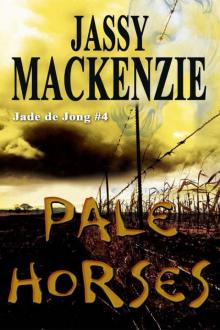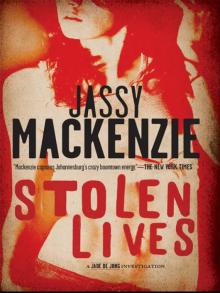- Home
- Jassy Mackenzie
Random Violence Page 8
Random Violence Read online
Page 8
After that, he’d knotted a rope to each of the boy’s ankles and tugged the knots tight under the chassis of the big, heavy vehicle. Then he and Farm Boy, now splayed, naked and writhing, across the Casspir’s angular grille, had gone for a good long ride in the bush.
This punishment wasn’t his invention. It was a well-known method of torturing captured terrorists on the way back to camp, to soften them up for interrogation. He’d never done it before. But he liked to think that he’d improved on it, on his own, that night.
He drove through the thickest trees he could find. The Casspir was old. Its camouflage paintwork was already scratched in a thousand places and it was tough as old boots. Nothing much could happen to the vehicle. But the same could not be said for Farm Boy.
It was amazing, Whiteboy remembered, how a man could scream through a gag. Sitting behind the thick windshield, he had watched the strong thorny branches whip and rip into Farm Boy’s white flesh, leaving hundreds of bloody lac-erations behind them. He’d become increasingly bolder and more inventive. After all, it wasn’t as if he would need to interrogate Farm Boy afterwards. He found a tree with a long, ragged stump of a branch jutting out. Long ago, an elephant or something must have broken it off. Whiteboy drove and reversed, drove and reversed. Each time, the branch ripped further up his victim’s thighs. Closer and closer to where the little white maggot was cringing away.
It had been an anticlimax, in the end. Such pleasures often were. He had revved the engine before delivering the coup-de-grace and sent the vehicle hurtling forward in order to embed the branch in Farm Boy’s groin. Whiteboy was looking forward to seeing what would happen. He remem-bered smiling as he put his foot on the accelerator, his armpits damp against his heavy body in the tropical night.
In his fear, Farm Boy found the strength to move himself further down the grille. God knows what he’d hoped to achieve by doing it. He was stupid until the end. The branch missed his groin. Instead, it ripped open a path higher up, through his stomach. It must have torn his diaphragm and ruptured his lungs, too, because he died quite quickly after that.
Whiteboy untied him and let his body slide to the ground. He undid the handcuffs and the ropes. Army property had to be accounted for, after all. Then he threw Farm Boy’s trou-sers and shoes out on the ground after him. He was in the middle of nowhere, deep in the bush. He was confident that it would take a couple of days at least for anyone to find the body, and by then it would be well mauled by small preda-tors, decayed and unrecognizable.
He’d stopped at a riverbed on the way back. For most of the year it was more or less dry, but the recent rains had swollen it to a torrent. He sluiced the front of the vehicle clean of blood. The next morning he overheard some talk that the boy might have deserted. Then it was discovered that supplies were missing, and everyone assumed that was linked to his disappearance. There was a half-hearted search for him a day or two after that. His remains were never found.
Shortly after that, Whiteboy was recalled from Angola and discharged from the army. But before he left, he heard through the grapevine that Farm Boy’s parents were selling off their farm. They were broken by the disappearance of their only child. They’d been keeping the farm as his inheritance.
Just for fun, Whiteboy went along to see the setup. It was closer to civilization than he expected, northwest of Pretoria, on the way to the Magaliesberg mountains. The land bordered a little go-nowhere tar road, which in turn eventually led to a little go-nowhere town called Rustenburg. On the way, the road passed close to a nearby black homeland.
There were a few of those homelands dotted around back then. They were mini-states within South Africa, ones that the government had allowed the blacks to have in compen-sation for taking all their other, and better, land away. He’d heard that a rich Jewish bloke called Sol Kerzner was building some sort of gambling mecca in this particular homeland. He was going to call it Sun City.
Whiteboy thought it sounded like a fun place. Cards and slots, blue movies, naked dancing girls. All the stuff that you couldn’t get in South Africa itself in the late 1970s because of the stupid outdated Calvinistic laws. He thought it might do quite well. And if it did, land along the Sun City road would become a sought-after commodity.
He bought the farm. It was extremely cheap and, because he arrived in his army camo and gave Farm Boy’s parents some sad little story about how he was struggling to make a living and had been their son’s best mate in the army, it was cheaper still. An extra special price for him.
It turned out to be an excellent investment. He’d subdi-vided it into ten smaller pieces and, over the years, sold off the sections. He’d sold the last one for ten times the original price of the entire farm.
The episode with Farm Boy had launched him into his future career.
Whiteboy heaved his bloated body upright in the seat. Time to phone his contact for information. He believed in having contacts he could trust. He liked having a history with people, some water under the bridge. He liked to be able to rely on them. That was one thing he’d learned in the army. You watched your buddy’s back, and he watched yours.
He snapped open the cell phone and made his call.
12
Following the route that Annette must have taken to work every day, Jade had an uneasy feeling that somebody was tailing her. In the last ten years and as many countries, her instinct had been sharpened, and she never ignored it. She glanced in her rearview mirror again. Three cars—a white van, a blue BMW and a cream-colored minibus taxi—were behind her. A few blocks ahead of her a black Mercedes with dark windows pulled onto the road. She couldn’t see whether it had number plates.
She turned left at a T-junction. The van turned left, the BMW turned left, and the taxi stopped in the middle of the road to pick up a passenger.
Jade switched the radio on to listen to the local lunchtime news. A cash-in-transit heist. One robber dead, one guard criti-cally injured. A police spokesperson said a surge of lawlessness was sweeping the country. The gas price was going up again, the rand had strengthened against the dollar, and Lindsay Lohan’s personal stylist was telling the world about the star’s addiction to shopping. That was it. Nothing about Annette. In radio terms, Jade hoped, her death was already old news.
She checked behind her again. The BMW was there. The van was there. The taxi had caught up and was trying to overtake all of them on a solid yellow line.
Jade turned down a side road, watching to see if anybody followed her. She saw no cars, although her uneasiness per-sisted. Either her instinct was wrong or the person tailing her was too experienced to be caught.
Rejoining the main road, Jade soon decided that if she were Annette, she would have moved to Cape Town too. Or found another job closer to home. Development was rife in the area, and traffic was at a standstill.
Stuck in an endless line of cars, she inched past a huge billboard announcing “A Place To Raise Your Brood” with a picture of an oversized duck swimming in a sapphire-blue lake. Below, bright red letters announced “Eagle’s Eye Estate,” “New Lifestyle Residential Properties!” “Secure Country Living! Homes Now Available!”
Further ahead on the left, all the trees had been cut down to make room for a paved maze of cluster homes surrounded by high walls topped with electric fencing that stretched as far as the eye could see.
On the right, more trees had been felled. A shopping mall that seemed to cover the same area as the Vatican City was being erected. Cement trucks and bulldozers crawled around the building site like industrious beetles.
“Eagle’s Flight Shopping Center. Secure Commercial and Retail Properties” an equally large billboard screamed.
Jade forced her way into the next lane to pass a truck piled high with gravel. It labored up the hill, chuffing gray clouds of smoke from its exhaust. If the traffic was this bad now, she didn’t want to think what it would be like when the residents of Eagle’s Eye and Eagle’s Flight moved in and started trying to get to and f
rom work every day.
Further ahead, a row of traffic cones had been placed on the left side of the road, narrowing the two lanes into one. She watched the Jo’burg drivers struggle with the concept of giving way to fellow motorists. For every two cars that reached the single lane, one had to go first and one had to go second. But there were unwritten rules. Minibus taxis always went first. She watched a driver dispute this decision. He tried to pull ahead and cut a taxi off. The taxi driver leaned out of the window with a friendly grin and then waved a crowbar at him.
The driver let the taxi in ahead of him.
Jade laughed. It was a novelty to be back in a country where breaking the rules was practically a national hobby, where people who considered themselves honest citizens drove without licenses, dodged tax, and employed illegal immigrants. Where bribery was a way of life, whether it was to avoid a spot traffic fine or win a government contract.
The average South African’s attitude to the law had given her father gray hairs, that was for sure.
She checked her mirror again. Close behind her was an angry-looking man in a big new car. He was weaving from side to side as if hoping to find a way past the traffic cones and crash barriers that now lined the road.
The taxi ahead of her stopped to let out a group of passen-gers, then pulled off again. They stood, flattening themselves against the yellow barriers, waiting for a chance to cross.
Jade stopped when she reached the little knot of people. Three men in threadbare overalls and a woman carrying a baby. They stared at her for a moment as if they couldn’t believe a car was actually waiting for them. Then they hurried across the road.
The woman with the baby was slower. As she was crossing, the man in the car behind her blasted his horn. A long, impa-tient blast that caused the woman to jump in fright and stumble sideways. Jade looked in her rearview mirror. The man was waving his hands around his ears, shouting out words she was glad she couldn’t hear. Then he lowered his hands and honked again.
Jade got out of her car. The wind was blowing strongly, kicking up dust from the bare soil and sending it scudding along in hazy brown clouds. She could hear the groaning of machinery and the sound of drills, and closer, the thrum of idling engines in the queue behind her. She glanced at the waiting cars and noticed a black Mercedes with tinted windows in the line. Was it the same one she’d seen earlier? Luxury vehicles were so common in this part of Johannesburg, she didn’t know.
She walked towards the angry man. The taxi passengers, now safely across the road, stopped to watch her.
The man buzzed his window down. His face was red, his eyes concealed behind small round dark glasses.
“Is something wrong?” she asked, innocently.
“What the hell do you think you’re doing?”
She looked him over. Luxury car, expensive suit. Gold watch around his wrist. And an air of supreme, aggressive confidence.
“I was letting people cross the road.”
“They could have waited.”
“For what? Christmas?”
“You were holding up traffic.”
“The roadworks are holding up traffic. Look.” Jade pointed to the cones and crash barriers. “Construction. See?”
Behind them, someone else honked.
“For God’s sake, bitch,” the man shouted. His mouth was open so wide she could see the gold fillings in his molars. “Get back in your car and drive. Because if you don’t, I’m going to get out myself, and land you such a punch you’ll be flat on your back in the road. Woman or not, I don’t give a shit.”
“All right, then.” Jade walked back and climbed into her car. Behind her, she heard the man revving his engine in triumph. She pushed in the clutch. Then she popped her car into reverse and hit the accelerator.
Her car shot backwards. There was only room for it to travel a few feet before her rear bumper collided with the front bumper of the luxury car behind her. It was a small impact. She barely felt it. But for him, it was more serious. Because his airbag deployed.
Looking in the rearview mirror, she saw his body whip-lash backwards as the powerful bag shoved him out of the way, and then slump forwards again as the bag deflated. His expensive dark glasses fell out of the open window and shat-tered on the tarmac. His hands went up again, trying to push the half-empty airbag out of the way. He’d forgotten all about Jade. He was far too busy wrestling with the flapping nylon and, Jade knew, smearing the sticky white talcum powder from the deployed bag all over his dark suit.
She saw the taxi passengers at the side of the road shrieking with laughter and clapping their hands in glee. This was a sight none of them would ever forget.
Jade put her car into first gear and drove on. There was no need for her to check her mirrors now. For quite some time, there were no other cars behind her.
She examined her rear bumper carefully when she arrived at Yolandi’s office. She couldn’t see any marks on the solid black plastic. Good. She hadn’t wanted to damage the car, or get David into trouble with the rental company.
“Control your temper, Jade,” her father would have said, with that half-smile on his face that always left her won-dering whether he was angry or amused by the headstrong behavior of his only child.
She wondered what he would say if he knew how far beyond the law she had gone, and how much further she planned to go.
13
While Jade waited for the receptionist to finish a phone call, the two managers she had seen last time walked down the corridor. They wore different ties this time. One solid red, one solid blue. She heard them discussing South Africa’s recent cricket performance.
“All out in forty-three overs. Didn’t even break the hundred and fifty mark. And Smith scored two runs. Two. What kind of a captain is that?”
“Unacceptable,” the other man said.
As they passed by, one of the men stopped and stared at her. He looked her up and down. Jade knew what he was thinking. In her jeans and jacket, she didn’t look like a sales-person or a customer. So why was she waiting?
“Can I help you?” he asked.
“I’m here for Yolandi Storr,” she said.
“Yolandi.” He frowned. “And you are?”
“Jade de Jong. Investigator assisting the police.”
The red-tied man sighed heavily. “I’d better help you, then. What is it you need to know?” He gestured to a row of silver metal chairs opposite the reception desk. Jade took one and the manager lowered himself onto the neighboring seat, shifting his weight uncomfortably in a way that made her wonder if he suffered from hemorrhoids.
“I need access to her colleague’s computer. Annette Botha. I’m investigating her murder case on behalf of Superintendent Patel.”
The manager stared blankly at her for a moment and then shook his head, as if murder, police investigation and South Africa’s cricket defeat were too much for him to handle in one morning.
“You’re here about the murder case?”
“Yes.”
“OK. Sorry, I thought this was in connection with Yolandi.”
“Why?” Jade stared at him with rising concern. “Are the police investigating her?”
“They’ll want to talk to her, I’m sure. If she wakes up.” He stared at Jade, his expression grim. “Yolandi was the victim of an armed robbery at her home last night.”
“What happened to her?” Jade recalled Yolandi’s frail body and timid demeanor. She would have been helpless against an intruder.
“Tied up and assaulted with a blunt weapon,” the man replied. “She’s in a coma now, with severe head injuries. The police say she was probably left for dead. Emergency services took her to Sandton Medi-Clinic.”
Jade clasped her hands together. Her palms felt icy cold.
“Have they made any arrests?” she asked.
The manager shook his head. “Not yet. The guys got away, whoever they were. They were interrupted. A neighbor heard something, phoned to check, and when she didn’t answer
he pressed his panic button. When the robbers heard the alarm, they fled.” He adjusted his tie, tugging it away from his fleshy neck.
“And the weapon?”
“Cops reckon they forced her door with a crowbar, then used it on her. I went round there this morning. The place is a mess. And the computer is gone, I’m afraid.” He turned to her with an apologetic shrug. “Annette’s machine, the one you asked about. Yolandi had it at her house, so she could finish off the year-end. After what happened to Annette, she didn’t want to work late and drive home in the dark.” He shook his head. “I’m sorry. The robbers took it, along with everything else.”
14
Jade phoned David as soon as she was home. Moloi answered and told her he was in a meeting with Williams. She remem-bered Moloi as an enthusiastic rookie who’d joined her father’s team shortly before she left, one of the first big intake of black recruits. Today he was a captain, David’s right-hand man and, according to him, one of the few staff he could trust to do the best possible job.
She briefed him on the latest developments. A torched office, a missing detective, a stolen computer and one uncon-scious woman fighting for her life in intensive care. A black Mercedes with no number plates seen at Grobbelaar’s offices.
Moloi said he would inform his boss immediately.
With David working late, Jade had no culinary obligations in the form of cop food. After she’d updated her case notes, she began to prepare some soup for dinner. Healthy, warming soup with lentils and chopped tomatoes. She wrapped a few giant garlic cloves in tinfoil and put them in the oven to roast.
When the soup had been bubbling for an hour, she switched off the stove, unwrapped the garlic and squeezed the soft insides out of the crispy cloves and into the pot.
She tasted it. Superb. A delicious, subtle combination of flavors. And yet she felt something was lacking.
Jade glanced over at the plastic container of chili powder. She pulled it closer and had a short mental battle with herself.

 Pale Horses
Pale Horses Bad Seeds
Bad Seeds Random Violence
Random Violence Folly
Folly Stolen Lives
Stolen Lives The Fallen
The Fallen Soaring
Soaring Drowning
Drowning